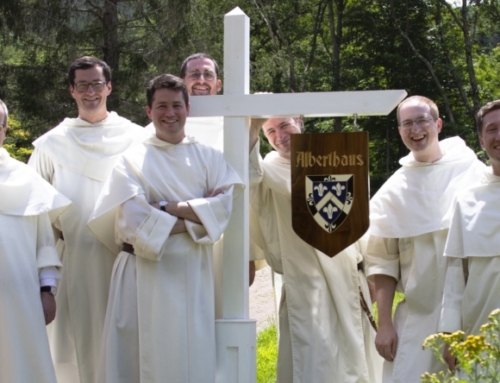We were a large group, gathered on a busy corner in Washington, D.C. Since we were in medieval habits and singing loudly, we got some funny looks. A few of us were greeting and evangelizing people, and handing out holy cards about Jesus Christ.
It was strange and shocking, but in a good way. Our repertoire included songs both sacred and secular. People especially liked stopping and listening to us when we sang popular songs. If anything, the popular songs helped to accent, by contrast, the radical eschatological sign value of our habits. Onlookers were, by turns, delighted and perplexed.
One woman completely missed the point. I handed her a card as she passed me, which she took gratefully. But then she looked at it more closely. “Oh,” she said as she put it back down, “it’s religious.” Even if people were confused about what we were doing, we were obviously joyful. And this joy opened up the space for us to share the Gospel.
Since so many people suppose that religion corrupts whatever is best about humanity, it shouldn’t surprise us that the good news can become a dead letter before it even hits people’s ears. But what if we encounter humanity transfigured by grace? St. Irenaeus said that “the glory of God is man alive.” Real Christian joy is an implicit refutation of the untruth that religion poisons everything. And if it is not only alive but also radiant, it points upward to that gift of God that comes down from above. “We have this treasure in earthen vessels, to show that the transcendent power belongs to God and not to us” (2 Cor 4:7).
Pope Francis recently said that “proclamation in a missionary style focuses on the essentials, on the necessary things: this is also what fascinates and attracts more, what makes the heart burn, as it did for the disciples at Emmaus.” And we do this not by preaching a moral code first, but by preaching the encounter with the risen Christ who died on our behalf.
Every grace, no matter how small, plays out a drama in the innermost of the human heart, where we either freely and generously respond to Him, or we do not. Do such small gestures—a prayer card and a few words—really have the power to open people up to the risen Christ? The answer is yes.
We should remember the seemingly wasteful generosity of the sower who casts the seed—the divine word—everywhere. So often we are not given the task of planting the seed, but only of casting it around us. We entrust it to the care of divine providence, which “orders all things well” (Wis 8:1), by directing each thing according to its nature. This same divine providence, which clothes the lilies of the field, provides for us far better than we could plan.
The response to grace, nurtured in the depths of the human heart, is hidden and secret. Jesus reminds us, “The kingdom of God is as if a man should scatter seed upon the ground and should sleep and rise night and day, and the seed should sprout and grow, he knows not how” (Mk 4:26–27). The offer of grace is not an empty promise on God’s part. Every grace is directed to eternal life as its goal—if only we cooperate. We have the joy of sharing the words of grace and life—and if that joy makes us look foolish, then let us be “fools for Christ” (1 Cor 4:10).
✠
Image: Jacob Jordaens, As the Old Sang, So the Young Pipe







